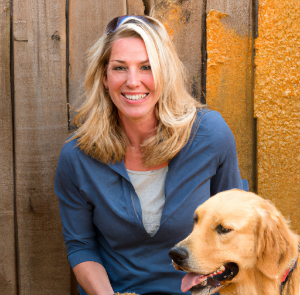Not everyone wants a guard dog and most people do not want a dog that is not sociable enough to be anything but a deterrent to visitors. It is important to lay correct foundations and ensure that your dog’s guarding behaviour is manageable at all times.
It is important to socialise every dog from a young age. Take the dog as many different places as possible when still a puppy or it will be fearful of strange situations. It should meet as many other dogs and people who will provide a favourable or non-threatening response to avoid fear of these as it ages too.
Never worry that allowing visitors to greet and treat your young dog or pup in your home will mean that he or she allows anyone to enter the house in your absence. The dog will be taking a lot of cues on how to respond to strangers from you. When you are relaxed and friendly, your dog will be happy to welcome visitors. If you are not around, the dog will probably react far differently and dogs do tend to be very good at reading suspicious behaviour.
In and out of the house encourage the dog to sit when approached by strangers and to accept a kind and gentle fuss as often as possible. Don’t expect it to put up with being rough-housed by people who approach you both, or allow people to behave in a way that could seem intimidating to your pet. The objective is to encourage polite interactions on both sides, show your dog that you will take the lead in deciding what interactions are to be permitted, and prove that your dog can trust you to make the correct decision in the matter.
Many dogs will bark at visitors to the house and most people do not find this too objectionable considering it a reassuring response to people at the door. It may be more worrying if this develops into growling, snarling and even nipping. Show your dog where the boundaries are. Never shout at or strike the dog which may only encourage an increasingly excited and aggressive response, but introduce a firm, short command that states enough is enough, e.g. Right! At that point remove the dog from the situation by immediately shutting it out of the room. Only allow it back into the room that the visitors enter when it is quiet and then praise it if it maintains a relaxed demeanour in their presence. Always give the dog a chance to behave appropriately, however you define this. Make sure everyone in the household is consistent with what the boundary is so that the dog is never confused and allowed to bark by one person but expected to meet visitors in silence by another member of the family.
Some guarding dogs may display a tendency to rest and sleep in the doorway of your home. They then see this as their bed area, and they will consider it their right to defend it to trespassers. As any owner is likely to have been taught, a dog’s bed is its place and it is not to be disturbed there. This will definitely worsen reactions to visitors that the dog feels are entering its space. Baby gates or dedicated pet gates are useful for restricting access to the doorway if needed.
It is unfair not to warn your friends that your dog will bark at them when they visit, particularly if you have a larger dog that they may find intimidating. If you are confident that, as with many dogs, it is purely a vocal response and they will never bite your visitors, emphasize this. When they visit ask that they greet the dog in the friendliest possible way, smiling, talking in a low and calm voice, and importantly, use the dog’s name. This seems to be quite effective in convincing the dog that they are ‘legitimate’ visitors. A nervous visitor and a noisy, defensive dog is not a fair combination to anyone, so practice this with dog-confident friends first.
If you do feel that your dog is becoming increasingly antisocial and is rough with your guests or appears to be becoming aggressive, it is time to get advice from a specialist trainer. If you feel that your dog could represent a danger to anyone if he or she ever got loose or if being walked, you have a serious problem on your hands and must get advice to prevent your dog from being involved in an ugly incident.
